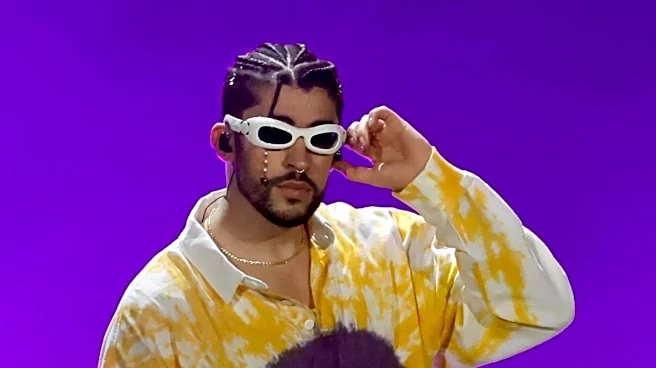What is the story about?
What's Happening?
The fashion industry is witnessing a resurgence of Y2K trends as New York Fashion Week approaches. This nostalgic style, characterized by unexpected layering and bold combinations, is making a comeback with a modern twist. Fashion enthusiasts are experimenting with layering techniques, such as wearing jackets over jackets and skirts over pants, reminiscent of early 2000s fashion. The trend is evident in the return of lingerie-inspired lace-trimmed dresses over jeans, as seen in The Row's spring collection. Additionally, menswear shows have embraced an American prep aesthetic, with designers like Jonathan Anderson at Dior and Michael Rider at Celine showcasing voluminous cargo pants and bold colorblocking. This revival of Y2K fashion is not only about nostalgia but also about playful experimentation and personal expression.
Why It's Important?
The revival of Y2K fashion trends signifies a shift in the fashion industry towards embracing nostalgia and individuality. This movement allows consumers to express their personal style through creative layering and bold combinations, challenging traditional fashion norms. The resurgence of these trends also highlights the cyclical nature of fashion, where past styles are reimagined for contemporary audiences. As major fashion events like New York Fashion Week set the stage for these trends, they influence global fashion markets and consumer behavior. Retailers and designers stand to benefit from increased demand for Y2K-inspired clothing, potentially boosting sales and encouraging innovation in design.
What's Next?
As New York Fashion Week unfolds, fashion enthusiasts and industry insiders will continue to explore and showcase Y2K-inspired styles. Designers may further innovate by incorporating these nostalgic elements into their upcoming collections, influencing future fashion trends. Retailers are likely to capitalize on this trend by offering a wider range of Y2K-inspired clothing, catering to consumer demand. The fashion industry may also see collaborations between designers and influencers to promote these styles, further driving their popularity. Additionally, the trend could inspire new fashion movements that blend nostalgia with modern aesthetics.
Beyond the Headlines
The resurgence of Y2K fashion trends raises questions about the cultural impact of nostalgia in fashion. This movement reflects a broader societal desire to revisit and reinterpret past styles, potentially influencing other creative industries such as music and art. The trend also highlights the role of fashion as a form of self-expression and identity, encouraging individuals to experiment with their personal style. As the fashion industry embraces these nostalgic elements, it may lead to a reevaluation of traditional fashion norms and inspire new approaches to design and creativity.
















